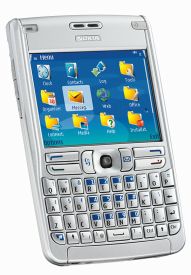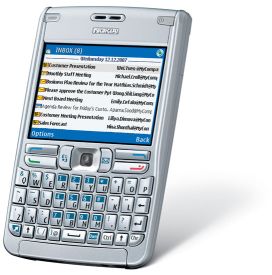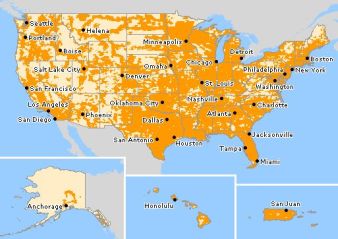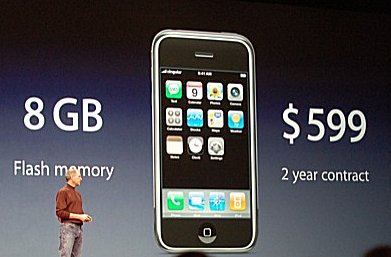Unlocking the Mobile Phone
You want to buy a car, so what do you do?
Would you do the following?
Go to the nearest fuel station and agree to buy all your fuel from them for two years. Also agree to pay a hefty monthly fee to cover the cost of the fuel and car. You pay for fuel every month even if you don't use any, plus extra charges if you use more than the agreement states. In return, the fuel station supplies you with any car from their very limited range, all of which have been altered to reject fuel from any other supplier.
Very few people would sign up for a "deal" like the one above, because it would be so restrictive about what you can do and where you can drive, and gives you no option of changing supplier if you become unhappy with the service. Moving abroad or selling the car on as a used model would also be far more difficult.
Beyond just the consumer's point of view, the government might well be unhappy with a situation where competition is being eroded at no advantage to the consumer, and might move to ban such a "deal".
Yet every week millions of people take up a similarly poor "deal":
Go to the nearest phone network operator and agree to only use their network for two years, and also agree to pay a hefty monthly fee to cover the cost of calls and the phone. You have to pay for the calls even if you don't make any, and there are extra charges if you use the network more than the agreement states. In return the phone network supply you with a phone from their very limited range, all of which have been altered to refuse to work on any other network. A locked phone.
Why do people buy locked phones?
 There are many reasons why people buy phones locked by phone network operators, but the chief one is that customers are being misled on many different levels. The network operators build up myths which protect their own position of power over which phones are sold and how those phones can be used.
There are many reasons why people buy phones locked by phone network operators, but the chief one is that customers are being misled on many different levels. The network operators build up myths which protect their own position of power over which phones are sold and how those phones can be used.
Myth 1: "You have to buy a phone from a network operator, it won't work otherwise"
And the truth is: People can buy a phone from anyone, just like they do with cars. Unlocked phones work at least as well (and often even better) than locked ones, phone network operators do not and cannot prevent unlocked phones using their network.
As long as a phone conforms to the current GSM standard and operates on the correct frequencies for the continent it's being used in (European/Asian phones in Europe and Asia, Americas phones in North and South America, tri -band or quad-band phones work anywhere), the phone will work on any SIM card from any GSM network. It doesn't matter whether the operators of those networks want it to or not, in fact it doesn't matter if the operators have even heard of the phone.
Note about CDMA: Some pockets of the world have CDMA network coverage but no GSM network coverage. Some people claim that CDMA networks just can't use SIM cards the way the GSM standard does, but this too is a myth. An equivalent to SIM cards called R-UIM cards have been available to CDMA network operators for several years now, and although many operators may not support them, the technology exists and it's the operators' fault if they don't make it available to their customers. R-UIM cards can be used in GSM phones too, so they would let people use the same number and billing account on both CDMA and GSM networks, which would be very handy when roaming.
Myth 2: "Phones are too expensive to buy at retail, you have to buy it with an operator's subsidy"
And the truth is: A basic 2006 model phone from major manufacturers such as Motorola or Nokia can be bought at retail unlocked and SIM-free for as little as $30 plus sales tax. Music phones can be bought unlocked for the same price as an equivalent capacity iPod, and people clearly have no trouble affording iPods at retail. Even smartphones are becoming relatively cheap nowadays: the Nokia E50 running S60 3rd Edition can be bought unlocked for as little as $200 plus sales tax.
Almost all phone users in rich countries can easily afford to buy their own phone. Even in developing countries a $30 phone isn't beyond the means of most families or villages, especially if the phone brings in extra income and pays for itself.
Myth 3: "Phones from network operators are cheap or free!"
And the truth is: They're not cheap or free at all!
Phones from network operators usually end up costing you more than if you bought them separately. You pay for these "cheap" or "free" phones in installments, as part of the monthly fee for using a phone service goes on paying for the "cheap" or "free" handsets. To top it all, the phone you get is locked to one network and sometimes crippled in some way, so it's not even as functional as a SIM-free model.
There are already many different forms of consumer credit for people who want to buy something in installments, such as credit cards, bank loans and store credit. These services are regulated by the government and in direct competition with each other, so they usually offer better and clearer terms than phone network operators. You'll see exactly what you're paying for, you'll be able to buy absolutely any compatible phone model from any retailer whether the operator approves or not, it won't have its functions restricted by the operator, and you'll probably end up paying less for it overall.
Myth 4: "The operators optimise the phone to work best on the network." And the truth is: They don't. The only things phone networks do to phones they sell are to brand them and cripple them, sometimes seriously.
And the truth is: They don't. The only things phone networks do to phones they sell are to brand them and cripple them, sometimes seriously.
Here's a good example: The Nokia E61 smartphone was a very popular model in Europe, and included Wi-Fi compatibility so you could surf the web and make internet phone calls for free when at home or in a hotspot. The American operators who were going to offer the phone didn't like this idea, and would only sell the E61 with its Wi-Fi removed. Nokia, faced with a choice of no American E61 sales or some American E61 sales, relented and the E62 was born: a phone absolutely identical to the E61 but with its Wi-Fi features removed to make free internet access impossible. American users of the E62 were forced into paying for internet access that should have been free, because the networks crippled their phone.
The E61/E62 affair isn't an isolated incident either, in the past many phones sold by network operators have had Bluetooth compatibility removed so that people couldn't download free ringtones or wallpaper from their PC or another phone. And, perhaps most infamously, operators frequently set the internet features of phones sold by them to have a "walled garden", where the user finds it difficult to access any web sites but the operator-approved ones. Another problem with locked phones has surfaced in recent years as phone manufacturers are making their latest firmware freely available on the internet, so that users can update their phones themselves. If you have a locked phone, there's a good chance it won't work with the firmware update services because the network operators' customisation makes the phone incompatible with the new firmware. Special editions of the firmware have to be created for locked phones, but these can take a while to appear because there are so many different operators around the world with so many different customisations. Sometimes locked phones never get firmware updates available on the internet.
Another problem with locked phones has surfaced in recent years as phone manufacturers are making their latest firmware freely available on the internet, so that users can update their phones themselves. If you have a locked phone, there's a good chance it won't work with the firmware update services because the network operators' customisation makes the phone incompatible with the new firmware. Special editions of the firmware have to be created for locked phones, but these can take a while to appear because there are so many different operators around the world with so many different customisations. Sometimes locked phones never get firmware updates available on the internet.
In theory there are some internet and multimedia message operator-specific settings which are pre-installed in locked phones, but these aren't required for basic functions such as calls or text messages, and can be installed automatically in any SIM-free phone by a text message from the operator (you just have to request such a message). Often the settings messages are automatically requested the first time you use a new phone with your SIM card.
Myth 5: "You can unlock the phone if you really want to, so locking really makes no difference."
And the truth is: Many countries now have laws or agreements that phone network operators have to allow customers to unlock their phones after a certain period, but how many people even know about this issue? And why should anyone have to unlock something they own?
Would it be acceptable if a fuel station and car sales chain locked cars they sold into only using that chain's fuel? Surely that would raise severe anti-trust issues?
Even when you do unlock a phone, you still have to contend with the operator customisations, and if they've crippled the phone's hardware (as was the case with the E62) then unlocking it won't make any difference, it's still a crippled phone. The operator customisations may also continue to cause problems with firmware updates.
 Myth 6: "The phone network operators give people on contracts great package deals which they couldn't get otherwise."
Myth 6: "The phone network operators give people on contracts great package deals which they couldn't get otherwise."
And the truth is: It's similar to a trick that a certain fast food chain beginning with M does: raise the portions and then raise the total prices. Pretty soon people are eating more than they've ever eaten before, and use their phones purely to use up their minutes. Then, in a self-fulfilling prophecy, because they use up their minutes they think the monthly fee they pay is reasonable.
A much better way of doing things would be to simply lower the call charges, and let customers decide if they then want to make more phone calls.
Package deals from phone networks have one purpose above all: to confuse the customer so that they cannot easily compare the prices of different phone network operators. If people can't compare prices, they have no reason to switch operator, and stay with whoever they use at the moment. It's anti-competitive, so consequently keeps prices higher and services poorer.
Myth 7: "Phones need phone network operators, that's why they have unusual pricing arrangements."
And the truth is: There's nothing special about phones. Cars need fuel, people need food, computers need internet connections, but none of these services are sold in packages where the supplier has signed the user to a 2 year contract, and none of them lock the user's hardware.
There is no reason for phones to be priced any differently to devices that use the internet or even just electricity.
Myth 8: "Operators who receive a steady income from contracts and locked phones are able to provide better services."
And the truth is: Finland has almost universal phone service coverage, you can get a phone signal and internet connection even in the middle of a forest miles from the nearest village, and even in the north which is within the Arctic Circle. High speed mobile networks are also increasingly common and available in every major city including those in the north. Finland has half the population density of the United States, and a lower average income per head.
How is it that Finland, a poorer, lower-density country without phone contracts, and with a law banning locked phones, developed far better phone coverage than America, the land of locked phones and 2 year contracts?


2006 GSM coverage in the USA and Finland.
(Note that the pale areas on the Finnish map indicate service available with an external aerial, while the pale areas on the American map indicate no service at all)
Something has gone terribly wrong with phone network operators: the middle-man has suddenly become the king.
The phone network operators have power over their suppliers and their customers, and can dictate terms to both of them. The operators don't have to try very hard at all, so the prices stay higher and the service quality stays lower.
There are real world examples which prove that phone locking simply isn't necessary, and can actually be immensely harmful to consumers. Here's one of them:
Welcome to Finland
 Until 2006, the Finnish government completely outlawed the locking of mobile phones. This led to a mobile culture where phones were separate from their network operator, just as a PC is separate from its ISP and a car is separate from a fuel station. Finnish people bought phones in the same way they bought cars, PCs or televisions, based on the merits of each model and from the widest possible selection of retailers. If they couldn't afford to pay for it up front, they paid the retailer on credit, just like they would with any other purchase.
Until 2006, the Finnish government completely outlawed the locking of mobile phones. This led to a mobile culture where phones were separate from their network operator, just as a PC is separate from its ISP and a car is separate from a fuel station. Finnish people bought phones in the same way they bought cars, PCs or televisions, based on the merits of each model and from the widest possible selection of retailers. If they couldn't afford to pay for it up front, they paid the retailer on credit, just like they would with any other purchase.
Network operators only supplied SIM cards, and service was available on a monthly basis with no long-term contract. It's possible to change an operator in Finland within a few days without even changing your number, so if you found another operator has better prices, there was absolutely no reason to stay with the more expensive operator.
All these together, the unlocked phones, the non-contract service, the ease of changing network operator, create something of great benefit to the consumer: fierce competition.
Once consumers are able to switch from one provider to another without penalty, there's absolutely nothing to stop your customers leaving you when they're unhappy. Prices of calls in Finland tumbled while services improved as the operators did what they were supposed to do and competed to keep their customers from switching. Prices of calls were also clearly laid out, there was one single rate for all calls anywhere any time, so it was incredibly easy to compare different operators.
But then one day...
All was great for Finnish phone subscribers: phone calls were cheap and getting cheaper, it was easy to compare prices, people could buy any phone model they wanted, none of the phones were crippled or altered in any way, and phone coverage was good, with new 3G and other high speed data services constantly expanding.
How Steve Jobs threw away a chance to make a real difference with the iPhone
 If one person has recently had a chance to fight against all this, it was Steve Jobs when he announced the iPhone. The iPhone was perhaps the most high profile launch of a single phone model for many years. It is also the sister product of the iPod range which is sold entirely at retail without any kind of subsidies for several hundred dollars per unit plus taxes, about the same price as SIM-free unlocked phones.
If one person has recently had a chance to fight against all this, it was Steve Jobs when he announced the iPhone. The iPhone was perhaps the most high profile launch of a single phone model for many years. It is also the sister product of the iPod range which is sold entirely at retail without any kind of subsidies for several hundred dollars per unit plus taxes, about the same price as SIM-free unlocked phones.
If Steve Jobs had wanted to, he could have launched the iPhone explicitly as a SIM-free smartphone, just as the Macintosh computer is sold explicitly ISP-free. He could have cut the phone network operators out of the picture completely. People will buy sim-free phones if they understand how unnecessary and restrictive network operator involvement is, as shown by the success of the phone market in entirely SIM-free countries like Finland (used to be!). Selling direct works for the iPod and the Mac, so why not the iPhone too?
Selling the iPhone exclusively SIM-free would also have allowed Apple to launch exactly the same model worldwide, which would have saved them money on production costs, brought it to the market more quickly, made it more reliable and made it easier to repair.
America isn't a market where SIM-free phones are even known about. Many Americans don't even realise they CAN use a SIM-free phone without the approval of their operator, and most tend to choose whatever their operator offers. Steve Jobs could have cut through all that, demolished this myth completely and virtually invented a whole new market segment in the US by selling the iPhone directly. The phone network middle men would have been powerless because the iPhone/iPod brand is so strong, and the entire phone world would have owed Jobs an immense amount of gratitude.
Instead, Jobs caved in to the power of the phone network operators and the iPhone has been crippled:
- If you want to buy an iPhone SIM-free, you can't.
- If you want to buy an iPhone and use it with a non-Cingular network, you can't.
- If you want to buy an iPhone but you don't live in a Cingular coverage area, you can't.
- If you want to buy an iPhone without a 2 year contract, you can't.
The fact that the iPhone is locked to a particular network fundamentally restricts who can buy it and how they can use it, in a way that isn't true with any other Apple product.
How would Apple fans react if the latest Mac computer was exclusively locked to a particular ISP, was only available to people who live in that ISP's service area, and people had to sign up to a 2 year contract with that ISP? The Apple fans would be mad as hell, so why on earth are they having to put up with exactly the same restrictions on a portable, pocket-sized Mac computer called the iPhone?
Jobs could still sell the iPhone exclusively SIM-free outside America, and it would be extremely interesting if he did that. He can do it in America when Apple's current agreement with Cingular expires, but there's no indication so far that Apple will do anything except toe the line like all other manufacturers in the US market have always done.
It's testament to the restrictive and stifling power of the US phone network operators that they can force a product as highly anticipated as the iPhone to be sold through them rather than being sold directly.
Parasitic Phone Network Operators have to be reined in
 The immense power network operators wield through a combination of locked phones and long term contracts is anti-competitive. It keeps prices high and services poor, it stops people being able to buy phones they want, vastly reduces the choice of phones available, and cripples the phones that customers are allowed to buy. Consumers are harmed by it, manufacturers are harmed by it, services are harmed by it and products are harmed by it. On top of all that, it locks people into regularly buying phones they don't want or need as "free" upgrades, so there's an environmental cost too.
The immense power network operators wield through a combination of locked phones and long term contracts is anti-competitive. It keeps prices high and services poor, it stops people being able to buy phones they want, vastly reduces the choice of phones available, and cripples the phones that customers are allowed to buy. Consumers are harmed by it, manufacturers are harmed by it, services are harmed by it and products are harmed by it. On top of all that, it locks people into regularly buying phones they don't want or need as "free" upgrades, so there's an environmental cost too.
Mobile phones are more than luxuries now, most of the developing world is coming to depend on the mobile phone not just as a communications device but as infrastructure for banking and commerce. Mobile phones are about to become, for the first time in their history, genuinely important to the majority of people on the globe.
Phone network operators must not be allowed to sponge off the world's poor, and for everyone's sake, rich and poor, this anti-competitive and parasitic behaviour has to stop.
How to free the phone
This is all easier said than done, of course, and much of the change has to be cultural as well as technical or legal. Here are three suggestions that would help bring about this change:
- Phone-locking should be completely illegal.
- Phone network operators should not be allowed to sell phones.
- "Free" phones should not be called free, but labelled exactly like any other product bought on installments with the real total price and interest rate clearly marked on all advertising.
As the Finnish example showed though, the phone operators have a tremendous lobbying power which is difficult to overcome. While we're waiting for enough politicians to realise and accept that the operators are worth taking on, we can make a difference right now by doing the following:
1. Don't buy phones from operators
2. Don't sign long term contracts with operators
3. Buy phones SIM-free from high street and online electronics retailers and other non-operator shops
The more we do those three things, the less power the operators have, and the freer, cheaper and better the phone world becomes.
Krisse, 25 Feb 2007

